Every individual player on a team has an impact, whether they made the buzzer-beater that won them the game or gave the encouraging speech in the halftime huddle that shifted everyone’s mindset. Look at Miami Heat player Udonis Haslem, a veteran leader known for his leadership, passion and motivational presence, despite having a minimal role on the court. Or Kansas City Chiefs’ backup quarterback Chad Henne, who brought energy and support from the sidelines during critical moments. These players are the underdogs whose contributions in the shape of relentless support, tireless work ethic and enthusiastic energy play a pivotal role in shaping a successful team. They are the heart and soul of a team’s journey.
Cooper Josefsberg, a former Miami Palmetto Senior High student, is a University of Florida basketball team walk-on. Despite marking very little play time and zero points, he left this season making a big impact on the team’s road to their national championship title. Josefsberg describes the team’s key component as its chemistry. Josefsberg plays a major role in this: he dedicates himself to keeping everyone energized and focused.
“I’m a super high-energy guy on the bench during games, making sure everyone stays locked in and keeps their head up when stuff isn’t going well,” Josefsberg said.
Josefsberg prides himself on maintaining a positive and supportive attitude, even during the toughest games.
“I’m always saying positive [messages], never blaming anyone, and just making sure everyone keeps their head up. I tell them ‘we got this, we’ve been here before, we’re good, we’ll get it done, ’” Josefsberg said.
Positive reinforcement serves to players on the field. It helps build confidence, especially when it comes from valued teammates. Being cheered on motivates people to keep playing hard.
“I make a difference from the sidelines by saying good things about my teammates when they do something good on the field. They always like to hear somebody cheer them on. When somebody screams my name when I’m on the field, it makes me feel better; it gives me confidence and builds my motivation,” junior and girls’ varsity lacrosse player Sofia Trujillo said.
Having players excited to show up to every game and to every practice, keeping that positive and energetic attitude, affects everyone on the team. It allows others to also feel excited and want to show up. By working hard in practice, not only do players better themselves, but they also allow others to benefit from this extra boost. For instance, offensive players must work harder by being challenged by hard-working defenders.
“Maintaining positive energy comes from the fact that I really do love this support and I love being [at practice and games]. I love seeing everybody do such a good job on the field and cheering people on,” Trujillo said. “When we are all hype on the sideline and cheer each other on, we play better. The energy is up and there is such good team chemistry because we all want to win, we all want to be there and we all want to work hard.”
This positive mindset, in turn, contributes to good team camaraderie, a necessary component of good playing. The University of Florida Men’s basketball team players view one another as more than just teammates — Josefsberg explains that their relationships contributed to their national championship.
“Our culture is in how close we are as a team. We’re all family, like brothers. This is the closest team I’ve ever been on. I play a big part in this through my comedic energy when we hang out,” Josefsberg said. “Because we are so close, we do all of these TikToks and hang out together. [It’s because of this bond] that when things go wrong in games, we don’t get mad at each other or blame each other. Because of our relationships off the court, we’re able to stick through [tough times], stay together and push through.”
Additionally, sideline players play a vital role by offering valuable insight to those currently on the field or court. They provide a different perspective, often seeing things active players might miss. For example, if a defender is approaching from behind and a player on the court cannot see them, a sideline teammate can alert them in time.
“[I give] the players input from what I can see from the sidelines that not everyone can see while they’re in the game and help them make adjustments to what is happening,” Josefsberg said. “When we get into the locker room at halftime, I tell everyone and the guys that are playing what they need to adjust and what we can see from the sideline so they know what to do differently for the second half.”






